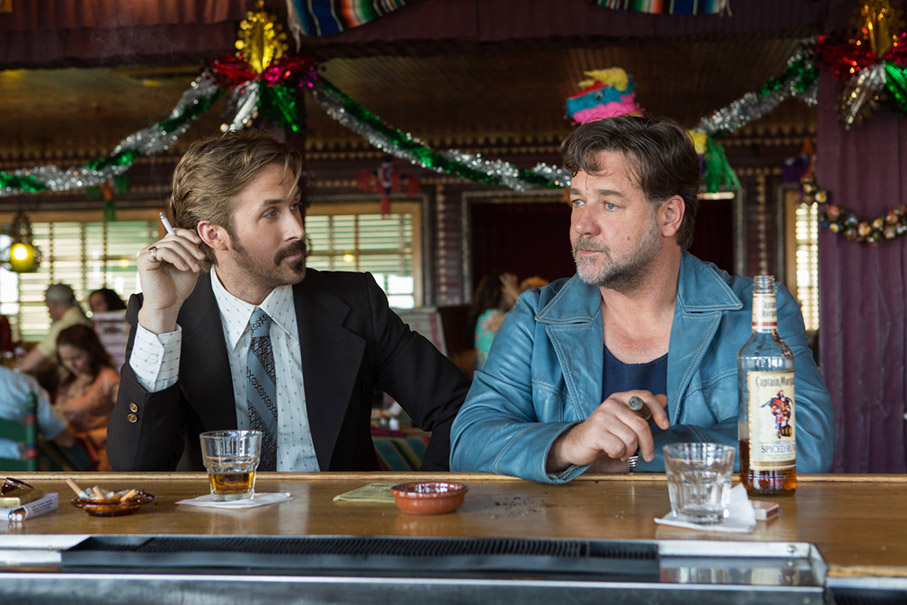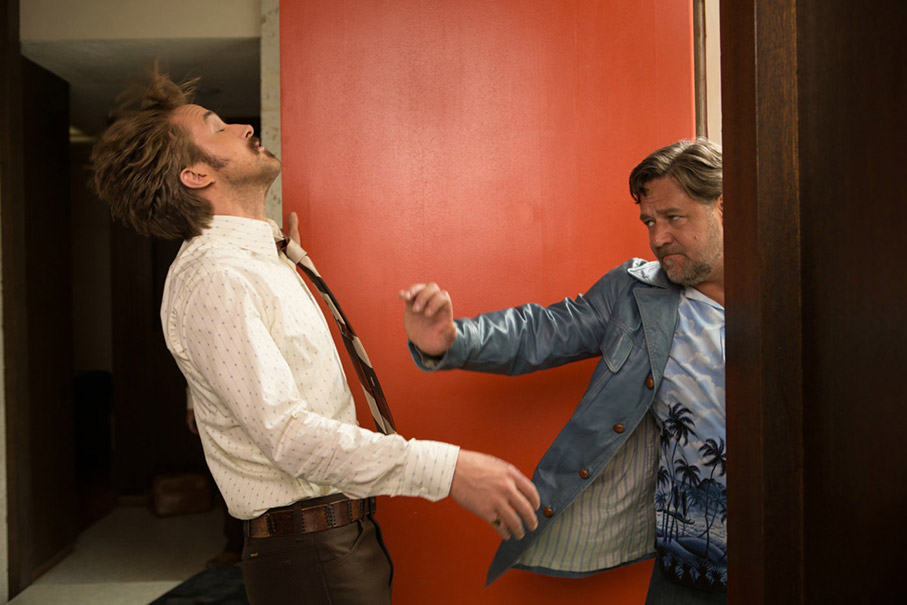| |
"But I just had a hunch that these two guys would be funny. Good actors like these just know how to do almost anything. Russell has said, "We just listened to each other." That's what chemistry is. And I watched it. It just took a few nights of them together in a hotel suite for them to know each other." |
| |
Writer/Director Shane Black |
Chemistry on film is an elusive beast. You know it when you see it and you know it even more when you don't and those hoping to generate it are trying way too hard. I'm not even sure it can be generated. Chemistry on screen, unlike its actual broad, multi-element enclosing definition, is essentially a compound. Do these two elements work well together? Is the wordplay and physicality effortless? Black's previous Kiss Kiss Bang Bang put two very different actors together, both in their own careers on a gentle downward slide. Robert Downey Jnr., not that far from his own troubles teamed up with Val Kilmer and created a double act that I would have paid good money to see more of. Alas, despite the wonderful, sharp humour, the cleverness of the plotting and the charming and funny performances not to mention a standing ovation at the 2005 Cannes film festival, the movie died in the marketplace. Based on RDJ's enormous current popularity, someone should make a big fuss of it on Blu-ray. The Nice Guys (not wild about the title I have to say, what's wrong with The Good Guys?) is in the same universe as Kiss Kiss but like a good jazz riff, it plays the same melody but in wildly different keys and with disparate timings.

The labyrinthine plot, set in 1977, involves a dead porn star Misty Mountains (not her real name), an elderly, myopic eyewitness convinced the 'actress' was seen alive after her death and a muscleman hired to do nasty things to men he believes deserve it. The sub-plot involves machinations by the automobile industry and the higher echelon government bigwigs to play down the less healthy aspects of what is spewed from their products' tailpipes. Think Volkswagen with prettier CEOs. Russell Crowe plays the muscleman who puts people in hospital, with the beautifully ironic name of Healy - that's the Crowe character's handle not the name of the hospital, duh. Up against his gruff pragmatism is a seedy private eye, Holland March who's as close to alcoholism as any man can be and still be functioning. Plastered in more ways than one after his first bone-breaking encounter with Healy, March, played by Ryan Gosling, is a screw up only really redeemed by the relationship he shares with his daughter who at thirteen redefines the meaning of the word precocious. Holly, played winningly by Angourie Rice, is as wise as her father is cynical, as practical as Healy is violent. But her smarts propel the two men forward when the plot manages to escape their combined abilities to put a few twos together. The movie's being billed as a comedy and it's certainly funny and laugh out loud so at times but there's a welcome edge to the film that stops it from being one smart-ass one-liner after another. When a death occurs three quarters of the way through, every one in the audience I saw the film with (it was a Monday afternoon and there were nine of us) all gasped with surprise and regret. If we cared about that victim, it meant the movie was working and working well.
Gosling is a very curious actor horribly suited to the 70s era, literally in some fashion senses. Whenever I've seen him, he's always been convincing but he's not broken out in the same way that Crowe did as Maximus Decimus Meridius in 1999. Gosling's role in The Big Short was, uh... a bit short but it was a key role, a Wall Street Cassandra with no idea what he was basing his hunches on. I see him sticking to character pieces until by luck or ill luck (whichever he may prefer) he gets to be a Neo in his own Matrix. He strikes me as being too sardonic for stardom, too idiosyncratic for celebrityhood. Being married to actress/model Eva Mendes, he may have missed that 'keep-private-life-private' boat. Relative anonymity as a character actor, to me, is a plus but I can see that it can blight an ambitious thespian straining for the big win. Crowe on the other hand has taken some high profile parts and made them all his own. Whatever anyone thinks of Crowe (and he's certainly generated enough negative press to print thousands of white and black papers), he's a consummate professional and an incredibly gifted and subtle actor. Yes, he's chunkier this time around but this only adds to the characterisation. You have to remember that his near the knuckle thug Bud White (another ironic name given his elastic morality) of L.A. Confidential was seventeen years ago... His co-star then, Kim Basinger, pops up in The Nice Guys as the government top dog seemingly able to sacrifice her daughter for the good of the car business. Yeah, OK.

The rapid pace of the film dares you to miss a detail. Black (teamed with his writing partner Anthony Bagarozzi) is too good a writer to expect the audience to catch a detail only divulged just the once. In Kiss Kiss, RDJ's narration even overtly and dismissively mentioned the movie chestnut of signposting... "...or the shot of the cook in The Hunt For Red October..." In The Nice Guys there's even a signpost that leads to a non-pay off because the signpost was delivered during a dream sequence. That is seriously screwing with an audience and I loved it. Regardless of their apparent reality, signposts are rather important. They are the counters you play the game with. So, signposts fly by and, as is a Black staple, expectations are gleefully subverted. There's a lot of humour to be mined from the audience believing it knows what's going to happen next. But then again, when you can have one of your lead characters deliver the following line soaking wet absolutely po-faced... "I was interviewing the mermaids," and then use it as a justification for accusing his partner of slacking off, you just know Shane Black's at the wheel. It's always struck me in a shark eating its own tail sense that the name 'Shane Black' could only have been made up by a Hollywood screenwriter called Shane Black. A cursory check tells me that this is his birth name... How oddly apt and slightly disappointing. I so wanted this talented screenwriter and director to have been born Gregorovich Nathaniel Austerlitz or something equally unlikely. Another wonderfully knowing line given the backdrop of the movie, something obviously close to Black's heart and other interested organs, is "So you're telling me you made a porno where the plot is the point?"
The movie is full of delightfully dark sight gags, some of which are a little near the knuckle gore-wise but still funny. Gosling falls from a balcony with a bad guy. He lands in the swimming pool and the bad guy does his best impression of a sack of vegetable soup, splattering just a foot to the side of the water. There's another falling body gag which is very funny if you allow your brain the luxury of not asking certain obvious questions just before the fall guy... uh... falls. But more important than any one notable aspect of the film is the relationship between Crowe and Gosling and it's a hoot. Probably because I have such love for Kiss Kiss, their banter doesn't quite reach the heights of Downey Jnr. and Kilmer who did incidentally kiss (but then that bar is high enough to chip ice off it) but it's still terrifically entertaining. Character revelations come while the other is asleep or dodging bullets. There's no maudlin sentimentality between the two. It just seems that each realises only just that little bit, that they are better men working together and especially if Holland's daughter Holly is on the case too. If there's a sequel count me in but the current numbers don't make that a likelihood. Catch it on the big screen but if you can't, get hold of both Kiss Kiss Bang Bang and The Nice Guys on Blu-ray or Netflix, and in honour of the latter, pull on a Starsky cardigan and to a Seventies beat, have a great double-feature night. |